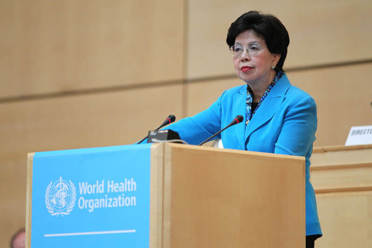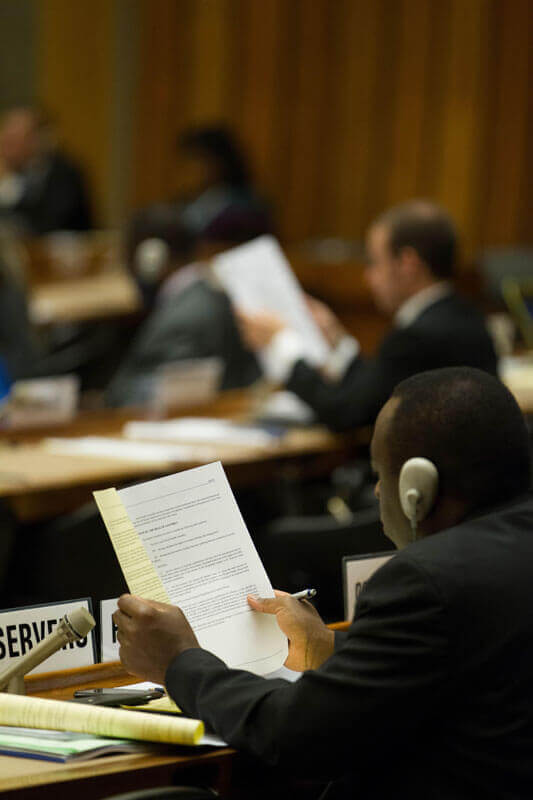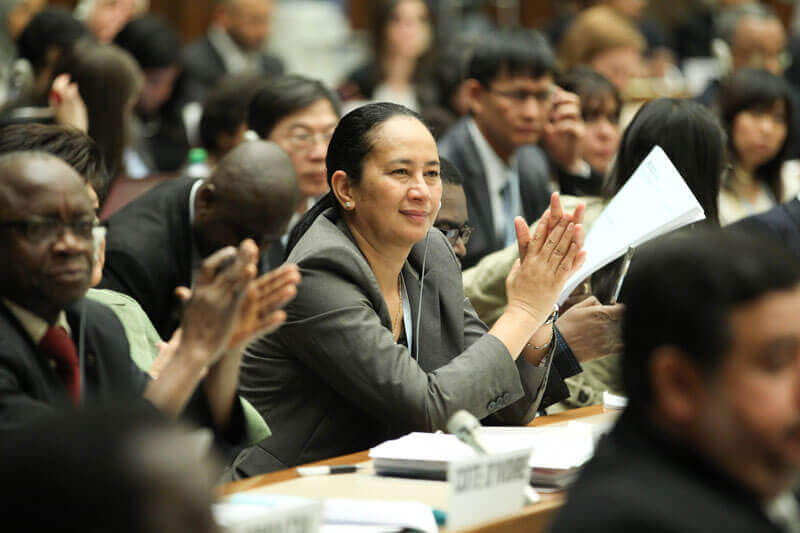Ashley BennettGHTC
Ashley Bennett is a Policy and Advocacy Officer at GHTC.

The 68th World Health Assembly (WHA) in Geneva wrapped up last week after addressing several items that will shape the next few years of global health innovation. While we’re very excited by the progress made, much hinges on the connections between this year’s assembly decisions, the finalization of the post-2015 Sustainable Development Goals (SDGs), and next year’s WHA, which will likely have an even greater focus on global health research and development (R&D).
Here are some highlights from the last two weeks:
First, there were several decisions that will impact the work of the entire global health community:
WHO budget increase approved
Member states approved WHO’s proposed program budget for 2016-17, increasing the biennial budget by US$236 million—a five percent increase from the previous cycle. The renewed push for malaria elimination through the Global Technical Strategy for Malaria was mentioned as one of the reasons behind the funding increase.
Work on non-State actors’ engagement framework continues
The Assembly also welcomed a report on progress of a draft framework for engagement with non-State actors—including nongovernmental organizations, private-sector entities, philanthropic foundations, and academic institutions—noting that it wishes to finalize the framework by the next WHA. Delegates requested that the director-general convene an intergovernmental meeting as soon as possible and submit a finalized draft for adoption at next year’s WHA, as well as submit a register of non-State actors. Delegates acknowledged the importance of WHO engaging with non-State actors, which may facilitate greater alliances between WHO and nonprofit product development organizations, as well as global health innovation advocacy groups.
It was also a big week for global health innovation:
Pooled R&D fund, CEWG recommendations progress

Member states officially noted a report outlining the role the WHO Special Programme for Research and Training in Tropical Diseases would play in hosting and managing a pooled R&D fund. The fund, which will be financed by voluntary contributions, is intended to support R&D for new technologies to meet the needs of low- and middle-income countries. Priorities areas for the fund will be identified by the WHO Global Health Research Observatory, which will be formally launched in January 2016. It remains to be seen how the structure of the observatory will ultimately be implemented, and how that will impact the work of the pooled fund. The pooled fund and observatory were developed as a result of recommendations from a 2012 report by the WHO Consultative Expert Working Group on Research and Development: Financing and Coordination (CEWG) which was looking for ways to fund R&D for and achieve access to treatments and technologies for diseases predominantly impacting the poor.
To demystify this conversation, GHTC and the Council on Health Research for Development cosponsored a live event and webinar at WHA that examined approaches to incentivizing global health R&D and ensuring access to technologies. The discussion featured panelists from PATH, Médecins Sans Frontières, Cipla, and the Norwegian Institute of Public Health. The webinar is available on demand here.
Timeframe for global strategy on public health, innovation, and intellectual property extended
Member states also agreed to extend the timeframe for action on The Global Strategy and Plan of Action on Public Health, Innovation and Intellectual Property (GSPA) from 2015 to 2022. The GSPA was adopted by members in 2008 “to promote new thinking on innovation and access to medicines.” The agreement also extends the timeframe of an overall program review of the global strategy on its achievement, remaining challenges, and recommendations on the way forward. A panel of experts to conduct the evaluation will not be established until early 2017, with their report to be presented at the 71st WHA in 2018.
WHO endorses Global Vaccine Action plan which includes support for R&D
During discussion around the Global Vaccine Action Plan (GVAP), member states approved a resolution that includes language directed at strengthening WHO’s prequalification program, which provides tentative evaluation of new vaccines and medicines. The resolution also included a call for increased capacity-building for R&D, technology transfer, and other elements of vaccine development.
Ebola epidemic prompts creation of new emergency response capabilities, greater emphasis on development of new technologies
As the Ebola outbreak in West Africa winds down, WHO’s efforts and preparedness for future health emergencies was a hot topic at the Assembly. Delegates welcomed WHO's commitment to make important changes in its emergency response work. Through an approved resolution, WHO will establish a new emergency response capability based on all-hazards preparedness with an emphasis on adaptability, flexibility, accountability, humanitarian principles, predictability, opportunity and country ownership. WHO also plans to establish a contingency fund of $100 million to finance emergency field operations for up to three months. R&D language was also included in the resolution, which supports the development of a ‘blueprint’ for accelerating R&D in epidemics or health emergencies where few or no technological solutions exist.
WHO approves global malaria strategy which emphasizes importance of research and innovation

Member states approved the Global Technical Strategy for Malaria,
which aims to eliminate malaria in at least 35 countries by 2030. The strategy emphasizes the importance of research and innovation, and the
need for political commitment, sustainable financing, strong health systems, and collaboration across different sectors. Dr. Pedro Alonso,
head of the Global Malaria Program, cited R&D as
a necessary endeavor to reach the lofty elimination goals outlined in the strategy.
WHO adopts global plan to combat antimicrobial resistance
A key item under discussion by governments was the draft WHO Global Action Plan on Antimicrobial Resistance (AMR) which was approve by member states. Angela Merkel, chancellor of Germany, opened the Assembly by calling AMR "an issue of crucial importance to humankind." Germany has made AMR a key priority during their current chairmanship of the G7. The plan calls for countries to put in place by 2017 systems to monitor drug resistance. It also calls for reductions in overuse of antibiotics and for more investment in new drugs and other health technologies.
GHTC member RESULTS, along with the Stop TB Partnership and Global Health Advocates, highlighted the need for drug-resistant tuberculosis to be central to the AMR Global Action Plan throughout the Assembly, and the Global Health Council and Global Health Advocates France delivered a
statement calling for drug-resistant TB to be central to the plan and included in
the Communiqué of the G7 Summit.
Role of Health in SDGs discussed
As the finalization of the SDGs approaches this fall, the Assembly discussed the need to secure a strong role for health goals in the overarching framework, and adopted a resolution urging member states to emphasize, among other priorities, “medical products, vaccines and technologies.” Through the Global Health Council, GHTC presented a statement highlighting the need to include health innovation targets and indicators in the SDGs.
Looking ahead to the 69th WHA:
Several R&D topics to be revisited
In comparison with last year’s WHA, this year’s agenda did not include as much substantive decision-making regarding global health R&D activities, such as the global health R&D observatory, the ongoing pilot demonstration projects, or the previously proposed R&D treaty. These topics will be revisited at the 69th WHA in 2016.
Regulatory strengthening expected to be discussed
We also expect that regulatory systems strengthening will be on the agenda in 2016, an area that is of interest to the US delegation in particular. Since the 2014 Ebola outbreak, interest has been revived in strengthening the involvement of stringent regulatory authorities, like the US Food and Drug Administration, in supporting quick review of emergency tools, as well as building capacity for regulation and increasing regulatory harmonization around the world.
As you can see, it was a very busy few weeks! We’re pleased with the outcomes from the WHA, but also see a need to ensure that the important agreements and resolutions are carried forward by member state governments and partners. Hopefully with the upcoming final post-2015 discussions and the next WHO Executive Board meeting only six months away, we’ll see the momentum for global health R&D continue.